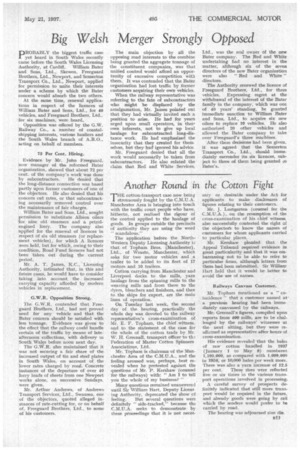Big Welsh Merger Strongly Opposed
Page 45

If you've noticed an error in this article please click here to report it so we can fix it.
DROBABLY the biggest traffic case
yet heard in South Wales recently came before the South Wales Licensing Authority, at Cardiff.. William Bater and Sons, Ltd., Skewen, Freeguard Brothers, Ltd.. Newport, and Somerton Transport Co., Ltd., Newport, applied for permission to unite their interests under a scheme by which the Bater concern would absorb the two others.
At the same tithe, renewal applications in respect of the licences. of William Bater and Sons, Ltd., for 40 vehicles, and Freeguard Brothers, Ltd., for six machines, were heard.
Opposition was offered by the G.W. Railway Co., a number of coastalshipping interests, various hauliers and the South Wales branch of ARC)., acting on behalf of members.
72 Per Cent. Hiring.
Evidence by Mr. John Freeguard, now manager of the reformed Eater organization, showed that about 72 per cent, of the company's work was done by subcontractors. He denied that the long-distance connection was based partly upon former customers of one of the objectors. He also denied that his concern cut rates, or that subcontracting necessarily removed control over the maintenance of fair charges.
William Eater and Sons, Ltd., sought permission to substitute Albion oilers for nine old steamers and a petrolengined lorry. The company also applied for the renewal of licences in respect of six old steamers (or replacement vehicles), for which A licences were held, but for which, owing to their condition, Road Fund licences had not been taken out during the current period.
Mr. A. T. James, KC., Licensing Authority, intimated that, in this and future cases, he would have to consider taking into account the increased carrying capacity afforded by modern vehicles in replacement.
G.W.R. Opposition Strong.
The G.W.R. contended that Freeguard Brothers, Ltd., had not proved need for any vehicle and that the Eater concern shouldbe satisfied with less tonnage, Evidence was given to the effect that the railway could handle certain of the traffic by means of lateafternoon collections, with delivery in South Wales before noon next day.
The G.W.R. also maintained that it was not securing a fair share of the increased output of tin and steel plates in South Wales, on account of the lower rates charged by road. Concrete instances of the departure of over 40 lorry loads of sheets from one Newport works alone, on successive Sundays, were given, Mr. Arthur Andrews, of Andrews Transport Services, Ltd., Swansea, one of the objectors, quoted alleged instances of rate-cutting for, or on behalf of, Freeguard Brothers, Ltd., to some of his customers. The main objection by all the opposing road interests to the combine being granted the aggregate tonnage of the constituent companies, was that unified control would afford an opportunity of excessive competition with them. It was contended that the Bater organisation had lost traffic by former customers acquiring their own vehicles.
When the railway representative was referring to the fate of subcontractors who might be displaced by the amalgamation, Mr. James pointed out that they had virtually invited such a position to arise. He had for years urged upon small operators, in their own interests, not to give up local haulage for subcontracted long-distance work. He had emphasized the insecurity that they created for themselves, but they had ignored his advice.
Mr. Freeguard denied that all the work would necessarily be taken from subcontractors. He also refuted the claim that Red and White Services, Ltd., was the real owner of the new Eater company. The Red and White undertaking had no interest in the matter, although six of the seven directors of the new Rater organization were also "Red and White" directors.
The Authority renewed the licence of Freeguard Brothers, Ltd., for three vehicles. Expressing regret at the withdrawal of the interest of the Rater family in the company, which was one of 40 years' standing, he granted immediate sanction to William Eater and Sons, Ltd., to acquire six new oilers to replace IQ vehicles. He also authorized 20 other vehicles and allowed the Bater company to take over Freegaard's three machines.
After these decisions had been given, it was agreed that the Somerton Transport Co., Ltd., should immediately surrender its six licences, subject to three of them being granted so Bates' s.




































































































